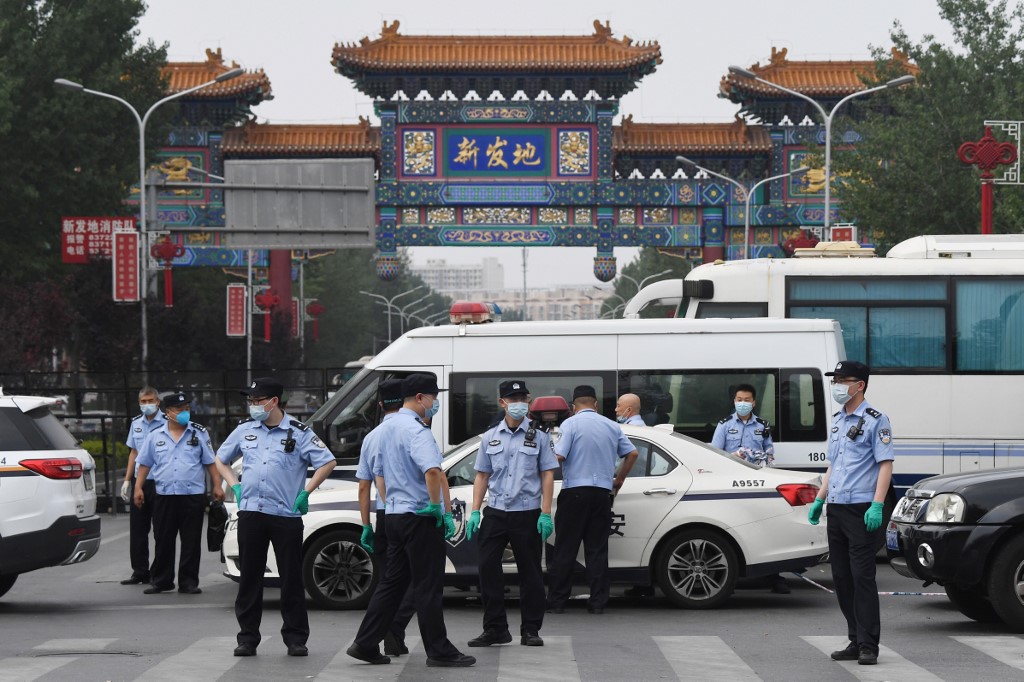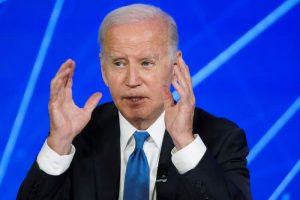Authorities in China’s capital raced on Monday to control a fresh coronavirus outbreak, with 75 cases linked to a single wholesale food market in Beijing, where authorities have locked down neighbourhoods and launched a massive test and trace programme.
The outbreak in China – where the disease first emerged last year – had largely been brought under control until a fresh batch of cases was detected in the capital last week.
Health officials reported 49 new coronavirus cases nationwide on Monday, including 36 more in Beijing where a cluster linked to the Xinfadi market has fuelled fears of a second wave of infections.
City official Li Junjie said at a press conference that cases had also been found at the Yuquandong wholesale market in the capital’s northwestern Haidian district.
As a result, that market had been closed and nearby schools would be shut, while people living in 10 housing estates around it would be forbidden from leaving their homes, he said.
It was not immediately clear how many households were under the new lockdowns, but the orders will affect thousands of people.
Test and trace
The capital has begun mass testing workers from the Xinfadi food market, as well as those who live nearby and anyone who visited it in recent weeks.
AFP reporters saw dozens of people queuing up to be tested at one local stadium on Monday morning, which was heavily guarded by people in hazmat suits.
Officials have said they plan to carry out virus tests on 46,000 residents in the area. More than 10,000 people have been tested already.
Several cities have warned residents not to travel to Beijing.
Officials are also stepping up efforts to trace people who have visited the Xinfadi market, with companies and neighbourhood communities messaging staff and residents to ask about their recent movements.
At least one building management company asked tenants to declare if any of their staff had visited the market or been in contact with those who had.
The outbreak also turned the spotlight on the safety of Beijing’s food chain.
A 19-year-old student surnamed Shao said she just started school in the capital a few days ago, but plans to return to her hometown because she’s worried about the virus.
“I just came to Beijing for a few days. Now I’m going to go home again,” she said.
There were also 10 imported cases reported on Monday, the likes of which have accounted for the majority of China’s cases in recent months as overseas nationals return home.
In total 177 people are now ill with the disease in China – two severely – which is the highest since early May
Lockdowns on Saturday
Lockdowns were imposed in parts of Beijing on Saturday amid fears of a resurgence in local transmissions in China, where the outbreak curve has been months ahead of the rest of the world, and comes as many European nations are further lifting lockdowns.
The pandemic is still surging elsewhere, particularly in Latin America, with Brazil taking the unenviable position of having the world’s second-highest death toll, behind the United States.
After the disease emerged late last year in central China, authorities there largely eliminated transmission within their borders through hyper-strict lockdowns later emulated across the globe.
But on Thursday, Beijing announced its first infection in two months and then said 50 more cases had been linked to the large Xinfadi meat and vegetable market, which provides much of the capital’s food supply.
Authorities then forced residents in 11 nearby residential estates to stay home, ordered mass testing and set up a “wartime mechanism”, deploying hundreds of police.
“Everyone’s very stressed,” an elderly driver said outside a fenced-off neighbourhood in southwest Beijing. “There are cases living in there. It’s real.”
Throat swabs taken from 45 people at the market tested positive, despite them having no clinical symptoms, Beijing city government said on Saturday.
The Global Times said the coronavirus was detected on a chopping board used by a seller of imported salmon at the Xinfadi market. A seafood market in Jinshen was also closed.
More than 435,000 dead
Worldwide, the pandemic has killed more than 435,000 and infected close to 8 million, while wreaking widespread economic devastation.
The number of global infections has doubled in slightly over a month – with one million cases recorded in the last nine days – and the virus is spreading most rapidly in Latin America.
Mexico and Chile on Friday recorded their worst days yet during the pandemic, while Chilean health minister Jaime Manalich resigned on Saturday amid a furore over the true disease toll there.
Brazil has recorded 41,828 deaths, surpassing Britain’s toll.
The WHO said this week the pandemic is accelerating in Africa. Botswana’s capital Gaborone was locked down on Saturday after new cases were detected.
In the US, which has seen the most Covid-19 deaths with over 115,000, more than a dozen states – including populous Texas and Florida – reported their highest-ever daily case totals in recent days.
Russian total doubles
In Russia, with the world’s third-highest number of cases, authorities more than doubled the official death toll for April after changing how the country classifies fatalities – finally agreeing to follow recommendations of the World Health Organisation.
The April figures from Rosstat, the official statistics agency, include 1,270 deaths where the virus was the main cause. But they now also include deaths where the victim tested positive for the virus but it was not the main cause of death.
There is still no treatment for COVID-19, but pharmaceutical group AstraZeneca said it has agreed to supply an alliance of European countries with up to 400 million doses of a possible vaccine.
German government sources said a vaccine could be developed by year-end.
‘Ready to welcome tourists’
A number of European countries are preparing to reopen borders on Monday after the EU Commission urged a relaxation of restrictions.
Poland reopened its borders to fellow EU members on Saturday.
France said it would gradually reopen its borders to non-Schengen countries from July, and Germany said it would end land border checks on Monday.
Greek Prime Minister Kyriakos Mitsotakis travelled to picturesque Santorini island on Saturday to open his country’s tourism season.
“Greece is ready to welcome tourists this summer by putting safety and health as our No. 1 priority,” he said in English.
Venice sprang back to life on Saturday, as hundreds of tourists flocked to the city for the reopening of the iconic Doge’s Palace.
“It’s a very strong emotion, like the first day of school,” said Maria Cristina Gribaudi, who heads the city’s Civic Museums Foundation.
In several European countries, the focus has shifted to the courts and who might eventually be blamed for the pandemic.
In hard-hit Italy, prosecutors grilled Prime Minister Giuseppe Conte over his government’s response.
“I explained everything to prosecutors,” Conte said Saturday, adding he did not fear a possible judicial probe.
Anger is mounting in France, where some 60 complaints have been filed against members of the government.
Britain’s Queen Elizabeth II meanwhile celebrated her official birthday on Saturday, with the normal pageantry of the traditional ceremony vastly reduced.
The 94-year-old monarch watched a scaled-down version of the “Trooping the Colour” on the grounds of Windsor Castle, where she has been staying during the virus outbreak.
In Spain, Lionel Messi returned to action as Barcelona resumed their La Liga title challenge and thumped Real Mallorca 4-0 in an empty stadium. Clean shaven, and without any sign of the thigh problem that prevented him from training earlier this month, Messi played 90 minutes and looked like he had never been away.
Live sport also returned to New Zealand on Saturday, as 20,000 fans watched rugby’s Otago Highlanders edge the Waikato Chiefs, 28-27. The country had gone 22 days without new coronavirus cases.
Meanwhile, the English Premier League finally makes its long-awaited return this week following a three-month virus suspension.
AFP
























